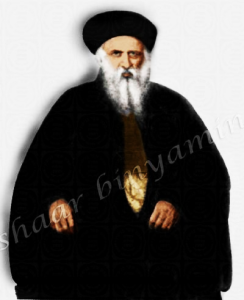 Print this Article
Print this Article

Golden Roots
Among the most ancient and illustrious families in Am Yisrael, the Abulafia family prominently stands out, tracing its roots back to the Golden Age of Sefarad, through Torah giants such as Ribbi Meir Abulafia HaLevi זצ”ל of Toledo, the first Ribbi Hayim Abulafia זצ”ל of Tiberias, and many more Hachamim and authors.
Ribbi Yitzhak was born in 1830 to his father, Ribbi Moshe זצ”ל, one of the leading Hachamim of the Damascus Jewish community. Young Yitzhak was quickly recognized as an exceptional prodigy and was summoned by his grandfather, Ribbi Hayim Nissim Abulafia זצ”ל – known as Rav Hinn”a – to study Torah under him in Tiberias, where he served as the Rav.
Joining his scholarly uncles and cousins, the young boy was held to very high standards. It is told, that he was once teased by an uncle for misreading a Gemara, which prompted Ribbi Yitzhak to increase his diligence and Torah study. He subsequently earned a great deal of esteem from the saintly Ribbi Hayim, who would not allow the other Hachamim to ever slight the honor of the budding scholar. Ribbi Yitzhak quickly joined the rank and file of Tiberias’s Hachamim and stood out for his great scholarship and sharp wit.
From Tiberias to Damascus
In 1862, Ribbi Yitzhak was sent out to the Diaspora to help ease the difficult financial state that crippled the community of Tiberias. As he journeyed through Lebanon, Lybia, Livorno and other communities, he was asked by many Hachamim to bestow his approbation on their Sefarim, to which he obliged. He returned to Tiberias with an international reputation as a first-tier Posek, and soon enough he was answering the halachic questions of great Hachamim around the world, including the Ben Ish Hai, Ribbi Hayim David Hazan and the Yis”a Beracha (both of which were Rishonim L’Tziyon), Hacham Haviv Sitehon זצ”ל and many more.
In 1873, the community of Damascus – where Ribbi Yitzhak’s father and many ancestors served as Poskim and Dayanim – asked Ribbi Yitzhak to serve as the city’s Rav, a position which he accepted and held with tremendous strength and dedication for forty years.
It is told that the butchers of Damascus once banded together to raise the price of meat beyond the reach of many of the city’s lower income families. Defying Ribbi Yitzhak’s order to lower the prices, the butchers held on to their stance well into Erev Yom Tov. Ribbi Yitzhak warned the head of the butchers that he would become severely ill if he does not obey the rabbi’s orders, which is indeed what happened. The head of the butcher’s quickly beseeched Ribbi Yitzhak’s forgiveness and lowered the prices, and the entire city was able to properly honor and celebrate the Yom Tov without worry.
Torah and Derech Eretz
Ribbi Yitzhak’s ingenuity and knowledge, combined with his humility, allowed him to put to rest many halachic disputes among the great scholars of Damascus. He was never too proud to rescind a P’sak if the other Hachamim were able to disprove his position, as is evident from the many volumes of his Teshuvot, “Pene Yitzhak”. Many years into Ribbi Yitzhak’s rabbinate, the Ottoman empire appointed the Saba Kadisha (Hacham Shelomo Eliezer Alfandari זצ”ל) to serve as rabbi of Damascus as well. Despite his wife’s and relatives’ efforts to try and dissuade him from taking the position, fearing that Ribbi Yitzhak would defeat him in Halacha, Hacham Alfandari accepted the challenge, declaring that for this reason alone it is worth it to move to Damascus, to study from this venerable sage. Yet, despite his seniority and power, Ribbi Yitzhak did not hesitate to accept many of the Pesakim of the younger Hacham and treated him with tremendous kavod and admiration.
Coming Home
In 1909, when Ribbi Yitzhak reached the age of 79, he felt that it was time for him to return to the city of his forefathers, the holy Tiberias, where he was welcomed with great respect and joy. The following year on the 16th of Adar Bet¸ the Pene Yithzak passed away and was buried alongside his legendary ancestors, members of the Abulafia family.